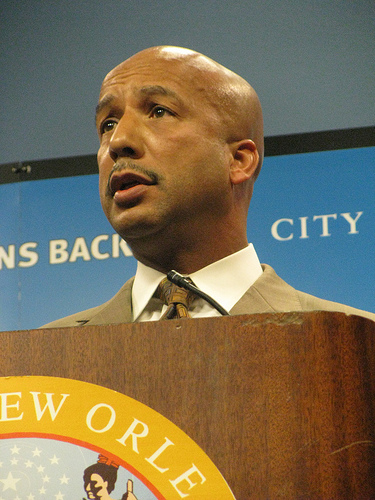By Ariella Cohen, The Lens staff writer |
More than a year after Ray Nagin left City Hall, New Orleans taxpayers are still feeling the pain of thousands of dollars in undocumented credit card purchases made by his administration in its waning days.
At least $12,000 in improperly documented purchases were made on city credit cards between January and May 2010, when Mayor Mitch Landrieu took office, the city’s independent financial auditor Joey Richard said this week.
But that likely is just the tip of an iceberg.
Discovered in an audit and noted in a report not yet made public, the unaccounted-for spending represents about half of the $30,000 in credit card expenditures audited to date, and only a portion of the city’s overall credit card charges in 2010. Richard did not provide a total for all 2010 credit-card spending, but the number is likely far larger than the numbers currently in play. During a six-month stretch in 2008, for example, Nagin aides charged more than $150,000 to a taxpayer-financed credit card account, one of 21 held by the administration.
“We looked at only a sample of spending. I don’t know the gross spending, or how much was undocumented. There could be much more,” Richard said. “There was $11,000 where we couldn’t even find an invoice, and then there was some where there was an invoice but no explanation. It could have been a business lunch or a lunch with someone’s wife. It could be anything.”
Though only a minuscule portion of the city’s $28.7 million budget shortfall for 2010, the unaccounted-for charges are symptomatic of larger weaknesses in the city’s bookkeeping.
“This is not typical … that about a quarter of the expenses (are) not adequately supported,” said Richard, a certified public accountant with Metairie-based Postlewaithe & Netterville Accounting and Assurances Service Group.
The news provoked outrage among Council members, in particular Councilwoman Stacy Head, a longtime critic of Nagin’s approach to accounting.
“I can’t say I am surprised,” Head said, “but this seems unbelievable that almost 50 percent of credit card charges did not have business expenses noted or supporting documentation.”

Other council members expressed all but giddy relief that the audit did not turn up improper spending by the Landrieu administration. “I am just so happy,” said Council President Jackie Clarkson. “They told us it would be better and it is better.”
But while all the undocumented charges were made by the Nagin administration, structural problems continue to dog City Hall’s finances. Richard noted several areas in which the city’s shoddy recordkeeping prevented auditors from identifying how taxpayer money was being spent.
“In a number of cases we saw journal entries posted in the books but the actual supporting documentation not attached,” he said.
Also lacking is a centralized, up-to-date record of contracts and contract expenditures, and an accurate list of active litigation pending against the city. Without such records, it’s difficult to accurately judge the city’s liabilities and, more broadly, its long-term fiscal health.
“We do have a list, the list is just not accurate,” Richard said.
Another problem discovered by auditors: The city ended 2010 paying too much money in overtime to police officers and firefighters, violating Civil Service regulations. “You have a number of employees who are over the limit in the police department and fire department,” Richard said.
“You need to change the Civil Service rules to do what your practice is, or change the practice,” he said.
Richard also raised concerns about a lack of security controls within the city’s computer system.
A few city employees have “super-user” access to the city’s computer systems as well as its financial records. That makes it possible to manipulate payment transfers and other monetary transactions, he said.
“It creates a hazard because the super-user can impact what is reflected in the books and can also be involved in the process of cash receipt and assignment,” Richard said.
Chief Administrative Officer Andy Kopplin said the administration is working on solutions to issues highlighted in the report, and has hired a new employee to track and record city financial transactions. Fewer employees in the current administration have access to city credit cards, he said. In contrast to the Nagin administration’s 21 credit cards, the Landrieu administration has six in circulation. The cards are held by Landrieu himself, Kopplin, Deputy Mayor for Public Safety Jerry Sneed, Deputy Mayor for Facilities, Infrastructure and Community Development Cedric Grant, Police Chief Ronal Serpas and Inspector general Ed Quatrevaux.
Kopplin said that the administration also would be working with the police and fire departments to cut down on overtime costs. “The Civil Service has a rule and that rule was violated,” he said. “We will be working with department heads who are responsible to make sure this isn’t happening.”
Though optimistic about the city’s financial prospects for 2011, Kopplin was frank about the challenges facing New Orleans as it struggles to balance its $488 million 2011 budget while still feeling the effects of an $11 million general fund deficit in 2010.
“We were operating like I was when I got out of college, hand-to-mouth, without a checkbook,” Kopplin said.
